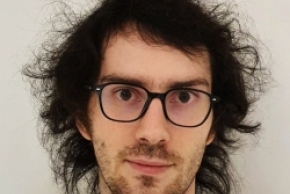Lucas Frédéric has just been recruited in the DER Chimie as associate professor. He took up his new position on September 1, 2023. He agreed to answer a few questions about his career, his projects and his vision of the position.
- Can you tell us a little about your background before coming to PPSM?
After high school, I studied at INSA Rouen, a public engineering school. First of all, I was in the integrated preparatory program, then I moved on to the "Fine Chemistry and Engineering" department to prepare the "Chemistry and Processes" diploma. In parallel, in my final year, I did a M2 research course at the University of Rouen to prepare for my doctorate. As soon as I graduated in 2017, I moved back to the Paris area to complete my thesis under the supervision of Dr Grégory Pieters at CEA-Saclay in the Molecular labeling and bio-organic chemistry unit (SCBM). My doctoral work focused on the synthesis and study of luminescent molecules for OLEDs. At the end of my PhD, I went as a post-doc to Geneva, Switzerland, in Professor Jérôme Lacour's group. I had the opportunity to work on the development of new synthetic methodologies applied to cationic helicenes (a class of fluorophores). In 2022, I left Switzerland to return to Paris, to Sorbonne University for a second post-doctoral position to work with Drs. Fabrice Mathevet and Lydia Sosa-Vargas in the Polymer Chemistry team (ECP) of the Parisian Institute for Molecular Chemistry. During this second post-doctoral contract, I was involved in the creation of new molecular and polymeric materials for metamaterials. And since September 2023, I've been working at PPSM as an associate professor.
- What is your specialty and can you tell us about your research project?
Through my doctoral and post-doctoral experiences, I have been able to specialize in both organic synthesis and photophysical characterization. In other words, on the one hand I synthesize and analyze new molecules, and on the other I study their photophysical properties, i.e. their interactions with light such as absorption or emission. My specialization also includes a strong emphasis on chirality (the property of an object that is not superimposable to its image in a mirror), particularly in the study of chiral molecules with the absorption or emission of circularly polarized light.
- What motivated you to join PPSM and how do you see your integration?
In the past, during my doctoral work, I've already been able to work closely with the PPSM, in particular for photophysical characterizations of some of my molecules. At the time, the laboratory was located in Cachan, but I was greatly impressed by the number of measurement devices available and by the expertise of the people with whom I interacted. This led me, among other things, to ask an ENS Professor to chair my thesis jury.
With these experiences, I had a global vision of the laboratory that attracted me. What's more, many of the laboratory's themes corresponded to my research interests. So, as soon as I saw the opening for an associate professor position at PPSM, I didn't hesitate.
As far as my integration into the team is concerned, I'd like to fit in with existing research themes, while at the same time trying to bring in the specific features of my background and expertise, particularly in the field of chirality. On the other hand, for the teaching part of my job, I'm still in a learning phase. As I haven't had many teaching opportunities in my career, I'm currently relying heavily on my colleagues, who make themselves extremely available to me, and I'd like to thank them for that!
- Do you have any ideas or personal projects that you would like to explore within the PPSM and its environment?
I have many ideas that I'd like to develop in this new environment. Both in terms of the scientific research I want to develop, but also in the "Paris-Saclay" context. I'd like to contribute, within my means, to the collaboration and development of the research and teaching activities of the Université Paris-Saclay, both on the Saclay campus and with the other campuses (Evry and Versailles Saint Quentin). I would also like to highlight the activities of the ENS, and in particular the Chemistry DER, in a more local environment.
5. Do you have any advice for young scientists aspiring to a career in your field?
The first piece of advice I'd give is: go abroad as soon as possible. Not only does it offer great personal experience, but it's becoming indispensable for research and teaching positions. I'd also advise taking the competitive entrance exams as early as possible, to get a feel for what's required and to familiarize yourself with the process. What's more, it allows you to "gain experience" and consolidate your portfolio and oral skills. A final word of advice: don't give up, even if current conditions are not optimal for the recruitment of researchers and professors.
If you want to learn more about Lucas you can visit its linkedin et ORCID pages
